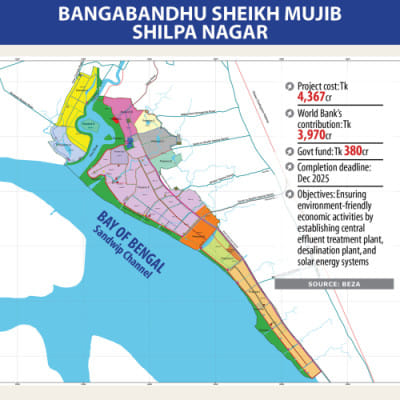Bangabandhu Shilpa Nagar to go green

The government has undertaken a Tk 4,367 crore project to turn the Bangabandhu Sheikh Mujib Shilpa Nagar (BSMSN) into an environment-friendly industrial city with a view to attracting more foreign investment.
The fresh project for the development of the BSMSN was approved by the Executive Committee of the National Economic Council (Ecnec) at its virtual meeting yesterday with its chairperson, Prime Minister Sheikh Hasina, in the chair.
The premier directed conducting massive publicity to inform the investors and attract those from abroad.
Bangladesh Economic Zones Authority (Beza) will implement the project between January 2021 and December 2025 in order to create an enabling environment for sustainable private investment and a dynamic local market for industrial land.
The World Bank will provide $467 million (about Tk 3,970 crore) for the initiative under its Private Investment and Digital Entrepreneurship (PRIDE) project and the remaining Tk 380 crore will be borne by the government.
This project will help transform BSMSN into a global standard and sustainable industrial city, said Beza Executive Chairman Paban Chowdhury.
He said land of two of the 30 zones of the BSMSN have been allocated for the investors.
The 30 economic zones under the BSMSN which will be of a global standard ensured with environmental compliance and utility services, security, communication and others of international standard.
According to him, although different facilities will be created under this project, the whole of the BSMSN would be benefited.
He said investors who focus on taking initiatives on their own to stay green would be rewarded with incentives.
The project will create opportunities in attracting domestic and foreign direct investment, rapid industrialisation, diversification of commodities, increase in export earnings and, above all, earning foreign exchange.
In addition, the implementation of the project will generate employment for a large number of people, including women, which will help in poverty alleviation. In this context, the Planning Commission thinks that the project is worth taking into consideration.
"The World Bank continues to support Beza's activities as the multilateral lender is satisfied with our actions," said Chowdhury, adding that this new initiative would promote foreign investment in the country's economic zones.
Under the project, Beza will construct a 30-kilometre road inside the BSMSN alongside other necessary infrastructures such as a central effluent treatment and desalination plant, solar energy systems and so on.
Initiated on January 1, 2014, the ongoing project to create the BSMSN is expected to be complete by January 30 next year.
Some 548 acres have been developed for industries in the BSMSN-1, some 1,939 acres in the BSMSN-2 and 474 acres in the BSMSN-2B. A total of 114 industrial units have already been allocated land across the three zones under a phase-1.
As of January 2021, numerous businesses from both home and abroad have come up with investment proposals valued at $20 billion for the industrial city, according to Beza data.
The World Bank previously provided $500 million for the BSMSN's development on condition that no factories would be set up before the utility connections were provided.
Now 13 different companies, including Asian Paints, McDonald Steel, Modern Synthetic and TK Group, are currently setting up their manufacturing units there.
"These factories will go into commercial production by this year," Chowdhury said.
According to the Beza executive chairman, the BSMSN seems to be slowly taking shape day-by-day as investors have started developing the physical infrastructure of the 30,000-acre economic zone.
"With this, we hope that total investment in the BSMSN will reach $30 billion by 2030, which will be equivalent to the total investment made in all other economic zones combined," he added.
Chowhudry went on to assure that local and foreign businesses would enjoy equal benefits at the BSMSN.
Once complete, the zone will become the third largest city in Bangladesh after Dhaka and Chattogram as around 15 million people will live and work in the adjoining areas, Chowdhury said.
The Ecnec approved another project styled "Digital entrepreneurial and innovative ecosystem development" involving Tk 335 crore.
Of the total cost, World Bank will finance Tk 255 crore and the remaining Tk 98 crore will be borne by the government.
Under the project, university-going students aspiring to be tech-entrepreneurs are set to get a shot in the arm as the government is planning to create innovation hubs at both public and private universities to develop digital entrepreneurship and innovation ecosystems.
Besides, the meeting also approved a project involving Tk 428 crore to develop the skills of 256,000 unemployed and disadvantaged women to turn them into entrepreneurs and create jobs.
The project will aim to make 1,600 women self-employed by setting up 80 sales and display centres and an equal number of food corners and beauty parlours.
The Jatiyo Mohila Sangstha, a welfare organisation for women under the women and children affairs ministry, will execute the project between January 2021 and December 2025.
The premier took part in the meeting through video conference from her official Gono Bhaban residence. Ministers, state minister, secretaries and other officials concerned joined the meeting from the NEC Conference Room in the city's Sher-e-Bangla Nagar area.


 For all latest news, follow The Daily Star's Google News channel.
For all latest news, follow The Daily Star's Google News channel. 



Comments